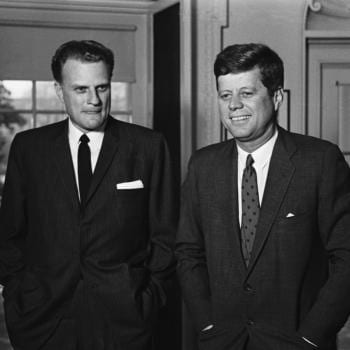Matthew Schmitz must be a terrific poker player. At a time when the reasons for becoming a Roman Catholic are not looking particularly good, the editor at First Things, a convert from the Calvinistic Baptist world, has gone all in on the Roman Catholic Church’s possession of the true path to salvation. Particularly, in response to three recent deconversions — Melinda Henneberger, Melinda Selmys, and Damon Linker — Schmitz has the intestinal fortitude (some might say, temerity) to write that leaving the church is death:
A Catholic is bound to view every act of apostasy or schism as spiritual suicide, a choice against life.
(For an exchange between Schmitz and Rod Dreher, go here and here.)
So again, Protestantism is not an option apparently. Even though Protestants confess the Nicene Creed, trust Jesus (maybe even more than Schmitz who seems to have a regard for the Virgin Mary that detracts from appreciating Jesus), read the Bible, pray, try to live moral lives, and generally crack down on wayward pastors and priests (at least outside the Protestant mainline), their Christian faith is not even imaginable.
Part of the reason for this elevated view of Roman Catholicism is its claims of superiority. For Schmitz, the higher the stakes, the greater the sense of disappointment.
The Church proclaims a higher, more demanding teaching than any other religious assembly. Because Catholic aspirations are higher, Catholic sins are always more shocking. Corruptio optimi pessima – or as DH Lawrence put it, “The greater the love, the greater the trust, and the greater the peril, the greater the disaster.”
No other religion could produce villains on the scale of Marcial Maciel or Archbishop McCarrick, because their crimes mock the most beautiful creed. Linker is eloquent on this point: “When I converted to the Catholic Church 18 years ago, I did so in large part because I was deeply moved by the act of self-sacrifice that the church places at its heart.” Because he sees the beauty of Catholic claims, he is repulsed by the brazenness of Catholic sin.
At least, Schmitz does not put Martin Luther on the list of Roman Catholic villains, even though some traditionalists do. At The Wanderer, Raymond de Souza wrote about the reformer, for instance:
In this article, we’ll investigate Luther’s immoral principles, a natural consequence of his relativistic doctrine of sola fide. . . . Luther favored polygamy. Notably, polygamy is common among Muslims, and Luther admired them. He wrote: “It is stated that there is no finer government in the world than that of the Turks, who have neither a spiritual nor a secular code of law, but only their Koran. And it must be acknowledged that there is no more disagreeable system of rule then ours, with our Canon Law and our Common Law, while no class any longer obeys either natural reason or the Holy Scripture” (Coppens, The Protestant Reformation, p. 29 — “The Facts About Luther,” p .88).
Now, friends, if you find the Koranic laws more appropriate for Christians than the Christian laws and Tradition, then you must ask yourself: Which spirit is guiding your biblical interpretation?
That is a very different view of Luther than the one that Pope Francis proposed only a year ago at the time of the 500th anniversary of the Reformation:
Five centuries and 50 pontiffs later, Pope Francis declared last year that Luther was done a historic injustice. “I think the intentions of Martin Luther were not mistaken,” the Holy Father said. “He was a reformer.”
Moreover, Pope Francis continued, there was during the time of Luther “corruption in the Church. There was worldliness, attachment to money, to power… and this he protested.”
Even de Souza appeals to Lutherans, “brethren in Baptism,” to abandon Luther.
In which case, the answer to Schmitz’s question of what happens to Roman Catholics who leave the church could be that they become Christians outside the Bishop of Rome as Protestants. Schmitz himself should know of this possibility since he himself was a Christian (as a Protestant) before he converted.
Here’s the other irony: if the bishops today disciplined wayward priests and bishops the way that Pope Leo X had punished Luther by excommunicating him, folks like Linker, Selmys, and Henneberger would likely not feel compelled to leave the church.












